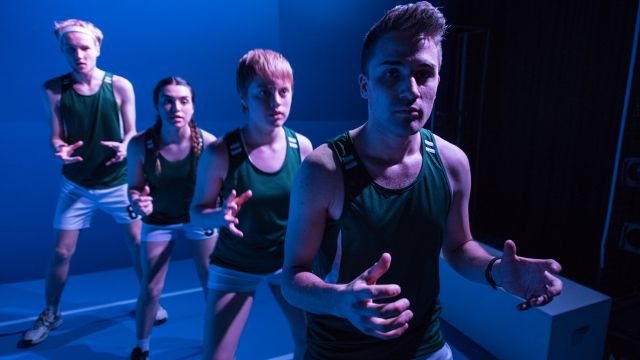Death Match
Death Match is about competition and winning – winning at whatever the cost. Here, sport is the metaphor – or the stand-in, so to speak – for any form of competition. The callisthenic exercises we see on stage, however, are not a test of skill but of fitness, body type (i.e. luck), will-power and endurance. With this choice, the play’s concept already makes an analytic comment on its subject and it has departed from the obvious way ‘sport’ is usually used as analogy or metaphor. Here, winning is not about who scores, but who is left standing – that is, who does not collapse or is simply defeated.
The show is performed by six fit young people - four women and two men, 3rd Year students of Monash University Drama Department. They are of varying body types, but all wear identical athletic gear. (The costume designer is Amy Porter.) They do not have names; they have numbers on their uniforms. As competitors, they are studiously blank and avoid eye contact – there is no interaction - but tension and anxiety are evident. They warm up – in unison – on a wide, shallow stage marked up as if for some generic game. The design – non-specific but immediately recognisable – is by Grace Ulrich.
 In the Malthouse Tower, the audience is close: we can see every grimace, twinge, flush or bead of sweat, hear every grunt and gasp. The simultaneous thuds of jogging and the squeak of sports shoes are familiar and evocative.
In the Malthouse Tower, the audience is close: we can see every grimace, twinge, flush or bead of sweat, hear every grunt and gasp. The simultaneous thuds of jogging and the squeak of sports shoes are familiar and evocative.
A cold, authoritarian voice comes from a loudspeaker with instructions as to which exercise the competitors are now to perform – X or Y or whatever. They know the code – of course: they’ve been practising for this, maybe all their lives. Game on! And they begin, again in unison, like perfectly choreographed dancers. Just watching them is exhausting. Perhaps these exercise routines go on a fraction too long, but it is necessary to convince us that with each trial someone will be eliminated. Each time someone is, confirmed by that voice from the loudspeaker.
Competition is interrupted by very personal monologues, which, at first, appear random, as if the theme has been lost. Not at all. The competitors are revealing their individual, idiosyncratic, vulnerable selves – to us, never to each other – the selves that are inexorably caught up in the competition of Life. The harsh unfairness is exposed. And at the quite heartbreaking end, all of them, the ‘winners’ and the losers, give us a chorus of all the clichés about winning and about never giving up.

I usually dread the ‘group devised’ theatre show: too often true collaboration is undermined by competing egos and focus is blurred by random ‘ideas’. Death Match, on the contrary, is focussed, disciplined and clear in its meaning. Yes, thisis the work of a group – something stressed in the joint writer and director program statement - but we can only assume that, over the three months of development, the central thread cohered and what did not amplify or illuminate that was stripped away.
It’s interesting to compare Death Match with Hoke’s Bluff, the show earlier this year from the Bristol based Action Hero – a play with a very similar idea: that the ‘competition’ and the language of competition exemplified in sports permeates every sphere of life, public and private. Action Hero employed the all-too-recognisable clichés of B-grade ‘sports movies’ to make their case. Death Match is more direct and grimmer; itresorts to its deliberate clichés only at the end – and it’s devastating to see these six attractive but now genuinely exhausted young people rattle off these pitiless and simplistic one-law-fits-all nostrums.
Michael Brindley
Photographer: David Sheehy.
Subscribe to our E-Newsletter, buy our latest print edition or find a Performing Arts book at Book Nook.

